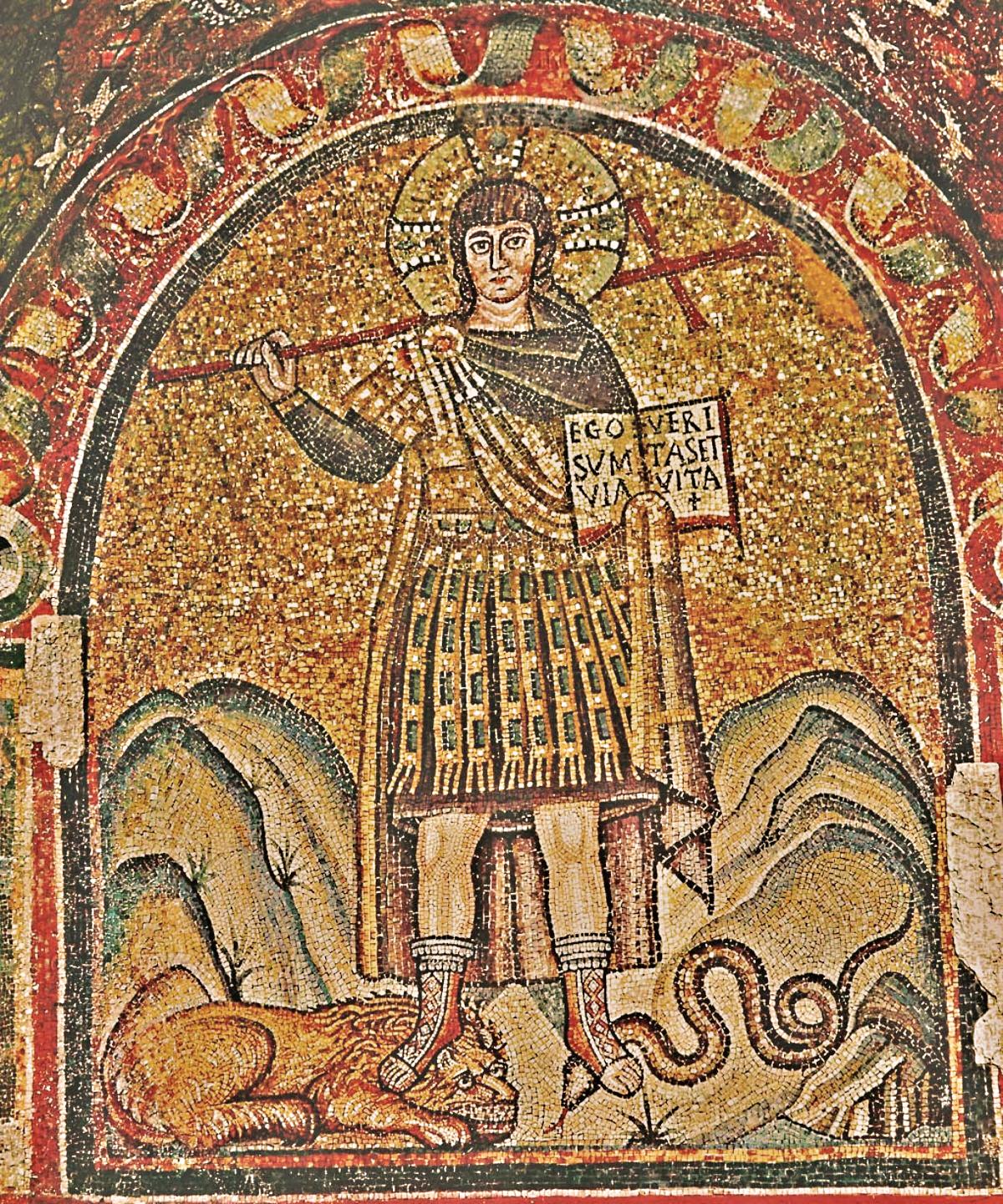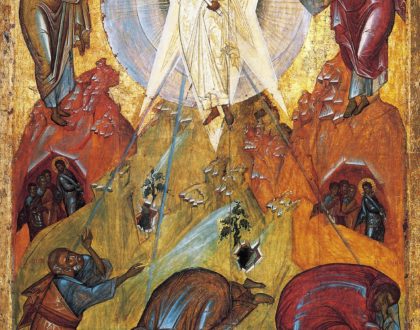May 20 // Psalm 68

by Julie Hordyk
Ascension Eve
Opening Prayer:
Thanks be to God, who gives us the victory through our Lord Jesus Christ.
— 1 Cor. 15:57
Psalm 68 (read at least the highlighted sections)
Praise and Thanksgiving
To the leader. Of David. A Psalm. A Song.
1 Let God rise up, let his enemies be scattered;
let those who hate him flee before him.
2 As smoke is driven away, so drive them away;
as wax melts before the fire,
let the wicked perish before God.
3 But let the righteous be joyful;
let them exult before God;
let them be jubilant with joy.
4 Sing to God, sing praises to his name;
lift up a song to him who rides upon the clouds—
his name is the Lord—
be exultant before him.
5 Father of orphans and protector of widows
is God in his holy habitation.
6 God gives the desolate a home to live in;
he leads out the prisoners to prosperity,
but the rebellious live in a parched land.
7 O God, when you went out before your people,
when you marched through the wilderness, Selah
8 the earth quaked, the heavens poured down rain
at the presence of God, the God of Sinai,
at the presence of God, the God of Israel.
9 Rain in abundance, O God, you showered abroad;
you restored your heritage when it languished;
10 your flock found a dwelling in it;
in your goodness, O God, you provided for the needy.
11 The Lord gives the command;
great is the company of those who bore the tidings:
12 “The kings of the armies, they flee, they flee!”
The women at home divide the spoil,
13 though they stay among the sheepfolds—
the wings of a dove covered with silver,
its pinions with green gold.
14 When the Almighty scattered kings there,
snow fell on Zalmon.
15 O mighty mountain, mountain of Bashan;
O many-peaked mountain, mountain of Bashan!
16 Why do you look with envy, O many-peaked mountain,
at the mount that God desired for his abode,
where the Lord will reside forever?
17 With mighty chariotry, twice ten thousand,
thousands upon thousands,
the Lord came from Sinai into the holy place.
18 You ascended the high mount,
leading captives in your train
and receiving gifts from people,
even from those who rebel against the Lord God’s abiding there.
19 Blessed be the Lord,
who daily bears us up;
God is our salvation. Selah
20 Our God is a God of salvation,
and to God, the Lord, belongs escape from death.
21 But God will shatter the heads of his enemies,
the hairy crown of those who walk in their guilty ways.
22 The Lord said,
“I will bring them back from Bashan,
I will bring them back from the depths of the sea,
23 so that you may bathe your feet in blood,
so that the tongues of your dogs may have their share from the foe.”
24 Your solemn processions are seen, O God,
the processions of my God, my King, into the sanctuary—
25 the singers in front, the musicians last,
between them girls playing tambourines:
26 “Bless God in the great congregation,
the Lord, O you who are of Israel’s fountain!”
27 There is Benjamin, the least of them, in the lead,
the princes of Judah in a body,
the princes of Zebulun, the princes of Naphtali.
28 Summon your might, O God;
show your strength, O God, as you have done for us before.
29 Because of your temple at Jerusalem
kings bear gifts to you.
30 Rebuke the wild animals that live among the reeds,
the herd of bulls with the calves of the peoples.
Trample under foot those who lust after tribute;
scatter the peoples who delight in war.
31 Let bronze be brought from Egypt;
let Ethiopia hasten to stretch out its hands to God.
32 Sing to God, O kingdoms of the earth;
sing praises to the Lord, Selah
33 O rider in the heavens, the ancient heavens;
listen, he sends out his voice, his mighty voice.
34 Ascribe power to God,
whose majesty is over Israel;
and whose power is in the skies.
35 Awesome is God in his sanctuary,
the God of Israel;
he gives power and strength to his people.
Blessed be God!
Who Daily Bears Us Up
Psalm 68 was selected for Ascension both in the Lectionary and the Daily Office, and it’s not hard to see why. The utterly unstoppable God has put his power on full display, and the Psalmist is there to record it. This is a warrior-king who shakes the Earth with his thunder and might, and summons hoards of angels in chariots to defeat his enemies. I challenge you, show me a more triumphant sobriquet than “Rider in the Heavens” (v. 33)!
Open your bible to Exodus 15 and you’ll find much of the same language is used to praise God after a decisive victory over Pharaoh and his armies. Of course! It was the Egyptians who were first scattered by the Lord, who, for the first time, though not the last, had risen up to defend Israel from an army (v. 1). The pillar of fire and mist show us how the Lord rides upon the clouds (v 4, 33). The processional of God’s people is not imagined in this instance; rather, it is remembered throughout generations as the crossing of the Red Sea is recounted (vv. 24-27). This decisive moment in Israel’s history shows clearly that their powerful, covenant-keeping God is for them.
The whole salvation story is like that: when God’s covenant people are in trouble, God descends to help them. Sometimes it took a miracle, like the gift of manna, or striking water from a rock. Other times God sent the right person for the time: Moses, David, Esther. When the time was right, the Father sent Jesus to deliver us all from sin and death. We know the story: one perfect life, a cruel death, and an impossible change: how he came back to life and ascended to heaven, where he will reign forever.
Allow me to make a brief foray into some theological weeds.
We have a number of ways to understand why Jesus went to the grave, and what his death and resurrection have done, or changed. These are called Atonement Theories, because Jesus’ work is still partly a mystery to us. It’s a wonderful thing. We know that Jesus died for our sin, and was resurrected from the grave to bring us eternal life; yet, when we try to describe the mechanics of how that actually came about, words fail us. We can’t say it all at once. Scripture itself describes Jesus’ work in multiple ways. What can we take from this? That, because the fullness of God cannot be held in human minds, we actually need multiple theories — or models, or even parables, if you will — working together, to grasp the meaning of Jesus’ work on the cross.
By some ways of understanding, Jesus’ death on the cross primarily demonstrates something; namely, God’s love for humankind. Other theories emphasize the value of Jesus’ own life: that, by his perfect sacrifice, he has made the final sin offering that justice requires, or that he has paid the price accumulated by all of our sin. Following cues from passages like Psalm 68, which show God fighting as a warrior, theologians such as Martin Luther and John Calvin have come to also describe Jesus’ work on the cross as a victory over sin and death. This theory is rightfully called Christus Victor, from the Latin, “Christ the Victor”. By this way of understanding his death and resurrection, Jesus descended spiritually to Hell and, during those three days, destroyed the Devil’s power to keep hold on us. He stole the keys; he ransacked the place. He left the door bolted open.
One objection to this way of thinking comes out of Jesus’ own apparent pacifism. He did not live by the sword, but by the Word of God — so is it fair to characterize him as a warrior? Or, to come at it from another angle, what’s the point of emphasizing a battle between a totally sovereign God and the misbehaving Devil? To answer the first, scripture itself characterizes God as the victorious Lord of angel armies, in Psalm 68 and elsewhere (notably in 1 Corinthians 15 and the central and late chapters of Revelation). So, yes. In our journey as faithful Christians, we must explore what it means to love a God who fights — though we may question the weapon (Augustine suggested that Christ’s chosen weapon was simply justice. See footnote). And to the second, we must remember how great the power of evil is in our world, and continue to take it seriously. The Coronavirus itself, spreading death and discord across the globe, should be enough to remind us of the stakes of this life and the next. On one side is death, and on the other side is life: we must follow the Victor.
The day of Ascension comes every year to remind us of God’s great and cosmic power; how he rules from the heavens and sends the Holy Spirit daily among us. It is a day to consider the coming Kingdom of God; how one day the heavens will split and all things will be made new. It is such an important day! In his ascension, Jesus shows us where we are all going.
In light of Psalm 68 and the story of the Red Sea, I am meditating on the immense grace of God who came down from those heights to be with us.
4 Sing to God, sing praises to his name;
lift up a song to him who rides upon the clouds—
his name is the Lord—
be exultant before him.
5 Father of orphans and protector of widows
is God in his holy habitation.
6 God gives the desolate a home to live in;
he leads out the prisoners to prosperity,
but the rebellious live in a parched land.
7 O God, when you went out before your people,
when you marched through the wilderness, Selah
8 the earth quaked, the heavens poured down rain
at the presence of God, the God of Sinai,
at the presence of God, the God of Israel.
9 Rain in abundance, O God, you showered abroad;
you restored your heritage when it languished;
10 your flock found a dwelling in it;
in your goodness, O God, you provided for the needy.
And, later:
19 Blessed be the Lord,
who daily bears us up;
God is our salvation. Selah
Daily, daily, he sends his Spirit among us and bears our burdens. So let us praise him, even as we wait for the day when Jesus Christ’s victory will be known in the world completely.
Thanks be to God.
Closing Prayer
O God, the King eternal, who divides the day from the night and turns the shadow of death into morning:
Drive far from us all wrong desires, incline our hearts to keep your law, and guide our feet into the way of peace; that, having done your will with cheerfulness while it was day, we may, when the night comes, rejoice and give thanks; through Jesus Christ our Lord. Amen.
Featuring: “Christ Militant”, 6th century mosaic.
Opening and Closing Prayers have been borrowed from the Book of Common Prayer.
In the writing of this week’s devotional I am indebted, as always, to James L. Mays’ commentary, Psalms: Interpretation.
Thanks also to Thomas C. Oden’s Classic Christianity: A Systematic Theology for help on the Atonement. From that book:
Demonic power is trapped by its own lust for power. Since the devil had become “a lover of power,” wrote Augustine, “it pleased God that for the sake of rescuing men from the power of the devil, the devil should be overcome not by power but by justice” (On the Trinity 13.13).
On the cross, Christ held back what was possible in him (conquering by power), in order that he might first do what was fitting (conquering by powerlessness).
p. 426
Like I said, I’m in the weeds a bit here. The day of Ascension is of great power and meaning, but the way that power is expressed can catch us a bit by surprise.
Still, let us follow the Victor.
Recommended Posts

“The Prayers of the Saints” Sermon Series
September 17, 2020

The Lord’s Prayer Curriculum | Personal or Small Group Study
September 17, 2020
July 15 // Psalm 139
July 16, 2020
